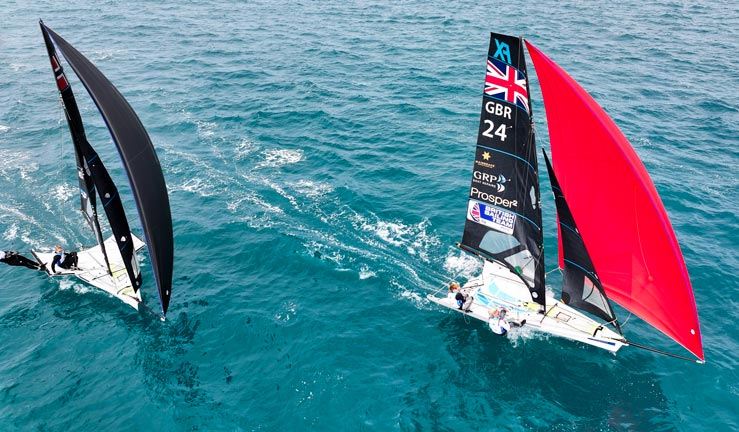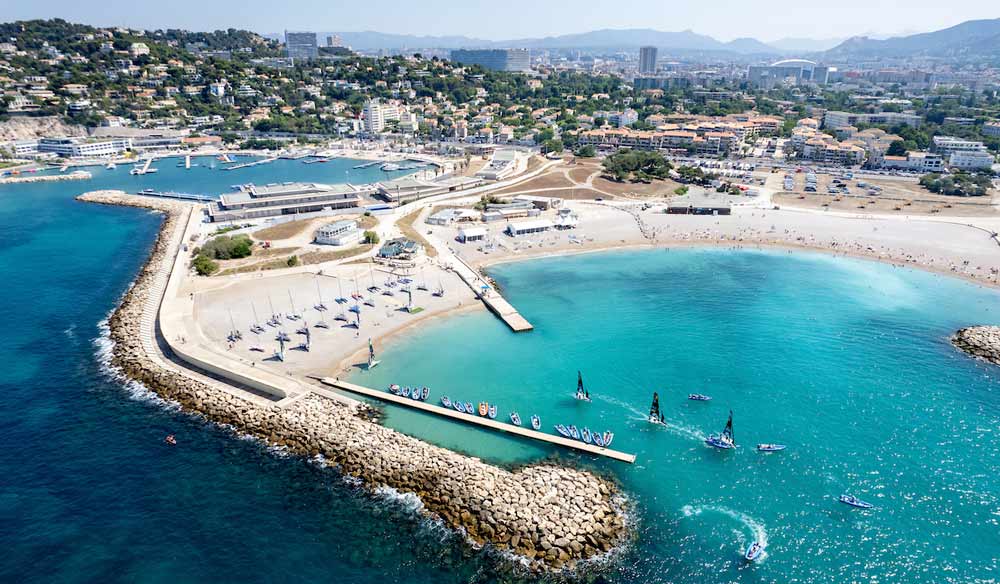Targeting the top spot

Can our sailors do it again? Ever since that breakthrough performance at the Sydney 2000 Games when Great Britain’s sailors took home three golds and two silvers from Australia, the British Sailing Team has set the benchmark for the rest of the world to follow.
Achieving top nation – the country with the most medals – at the Games is never a straightforward task. With the Covid pandemic delaying the Tokyo 2020 Games by a year, there have only been three short years for the sailors and support staff to get ready for Paris 2024. And that mainstay of golden success, the Finn heavyweight dinghy, is no longer part of the Games.
The Finn had been a phenomenal gold medal factory for Team GB, with Iain Percy, Ben Ainslie and Giles Scott collectively taking the top step of every podium, going all the way back to Sydney.
However, in the past few years the British Sailing Team has been working hard to get to the top of the new Olympic events – kiteboarding, known as Formula Kite, and the foiling windsurfer, known as iQFOiL. Along with the foiling catamaran, the Nacra 17, this means that five of the ten Olympic events are now high-speed hydrofoilers.

There has been a changing of the guard too. Some of Great Britain’s multi-medallists like Giles Scott, Hannah Mills and Stu Bithell have moved on to other challenges in professional sailing like SailGP and the America’s Cup. However, this year’s team will include Tokyo silver medallists in the Nacra 17, John Gimson and Anna Burnet, and Tokyo bronze medallist Emma Wilson who’s now flying high on the new iQFOiL board.
While the bulk of the Olympic sports will be taking place in France’s capital city, the sailing regatta is being hosted by the city of Marseille on the Mediterranean coast. The city is surrounded by the vast mountain ranges of Sainte-Baume and Etoile. The complex geography, mixed with a hot Mediterranean climate and the potential for dry winds from the Sahara, makes Marseille an unpredictable venue for sailing.
There are plenty of countries hoping to knock Great Britain off its perch as sailing’s acknowledged high-flier. While Australia and New Zealand are not looking quite so strong this time round, a number of European nations could be serious rivals to Team GB. Not least of these is the host country France, along with strong challenges from Spain, Germany, Italy and The Netherlands.

“We want Great Britain to win top nation again”
“We’ve been sprinting ever since Tokyo, because of the compressed Olympic cycle since Tokyo 2020,” says RYA Performance Director, Mark Robinson. “Of course, it’s the same for every nation, but there hasn’t been the usual year for resting and resetting, which is typically what people do in the year after a Games. We just had to get straight back into it.
“It’s especially fast-paced because four of the ten events are new to the Olympic circuit. Not only that, but men’s and women’s events in foiling kiteboarding and foiling windsurfing both run brutal Medal Series formats which place enormous emphasis on performing on the final day. Sailors used to be able to put together a consistent series across the whole regatta. Now sailing joins sports such as running and swimming in deciding the medals in a sudden death final.”

Robinson acknowledges that sailing has some significant differences that might well warrant the traditional model of rewarding a consistent performance across the week. “In sailing we’re working with a dynamic field of play where all kinds of factors – variable wind, waves, weather – can all heavily influence the outcome. But we’re in the Olympics and this is the way televised sport is going, so we’ve had to make sure our athletes are mentally prepared for these final-day formats.”
While much about the equipment and setup has changed since Tokyo, the medal target agreed with UK Sport remains three to five medals of any colour. “I think it’s very achievable,” says Robinson. “We’ve got good medal prospects across quite a few of the classes but, of course, we want Great Britain to win top nation again. And for that we’ll probably need some golds, and that’s the goal we set for ourselves at every Games.”
The team within the team
It’s sometimes said that, where athletes in other sports achieve personal bests and world-record times at the Olympic Games, in sailing competitors often perform below their best. Luckily the British Sailing Team has tended to buck this trend, nearly always rising to the big occasion. Of course, it’s not really luck at all, but part of the design of the team’s structure.
A big part of Team GB’s success is the support staff working behind the scenes, helping to bring out the best of our sailors. It’s also the camaraderie between the whole team. Once a sailor has finished their Olympic regatta, they stay to support to everyone else, all the way to the closing ceremony.
Kate Eddy, Head of Performance Support, is a member of this highly experienced team. She’s a strength and conditioning coach and biomechanist approaching her eighth Olympic and Paralympic Games, and has worked at the top level in a range of men’s and women’s sports. “I’m a surfer in my spare time, so I’ve got an interest in the sea and find sailing absolutely fascinating,” says Eddy.

“Compared with most sports, where the athletes are operating in a more controlled, predictable environment, sailors have to cope with such a random and ever-changing field of play. It’s incredible how they manage such a complex scenario.”
Eddy says the focus is on ensuring the sailors are prepared physically and mentally. “The challenge of the new board sports is the high speeds and potential for crashing, so we’ve worked closely on injury prevention,” says Eddy. “But the other side is the sudden-death nature of their finals, and to make sure they are in the right mindset to perform in that critical moment.”
Find out more
The Olympic sailing events will take place from 28 July to 8 August and will be aired on Discovery+.
For more information about the Games, our team of 14 British sailors and windsurfers, the Olympic sailing classes and all the latest news, visit our Paris 2024 hub.
Our Olympic preview was first published in the summer 2024 edition of RYA magazine.
